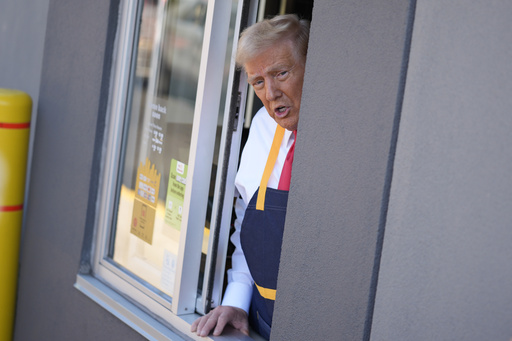
McDonald’s Corporation recently allowed former President Donald Trump to make an appearance at one of its restaurants in Pennsylvania over the weekend, clarifying that this does not equate to an endorsement for any candidate in the ongoing U.S. presidential election.
During his visit to a McDonald’s in the suburban area of Philadelphia, Trump took on the role of fry cook and engaged with customers through the drive-thru window. The restaurant was made off-limits to the general public during Trump’s time there.
According to a communication shared with staff, McDonald’s explained that franchise owner Derek Giacomantonio had reached out to them after finding out about Trump’s interest in visiting a Pennsylvania location. The corporation decided to allow the event to proceed.
“Learning of the former president’s request, we evaluated it against our principle of inclusivity: we open our doors to everyone,” McDonald’s stated. “As a brand, McDonald’s doesn’t back candidates for public office, and this principle will remain consistent for the current presidential race. We embrace everyone, regardless of political affiliation; we are not red or blue – we are golden.”
Furthermore, McDonald’s mentioned that franchisees have extended invitations to Vice President Kamala Harris and her running mate, Gov. Tim Walz, to host events at their locations. McDonald’s awaits a response from Harris’s campaign regarding this outreach.
Despite not actively seeking publicity, McDonald’s has become a central topic of discussion during this election cycle. Harris has referenced her time working at McDonald’s during her college days while on the campaign trail. In response, Trump has made unfounded claims suggesting that Harris is fabricating her history.
McDonald’s opted not to address this controversy directly in its communication to employees. Instead, the company acknowledged its pride in “Harris’s positive memories of working at McDonald’s” and highlighted that an estimated 1 in 8 Americans has held a position with the chain at some point in their lives.
“While we and our franchisees do not maintain employment records from as far back as the early ‘80s, the significance of ‘1 in 8’ reflects the shared experiences many have had with us,” McDonald’s noted.
Trump’s visit sparked some online dissent, with a temporary spike in Google searches for “boycott McDonald’s” on Monday morning. Several social media users expressed intentions to stop patronizing the restaurant chain following the former president’s event.
However, public relations expert Lori Rosen suggested that McDonald’s is unlikely to suffer long-term repercussions from this incident.
“The media coverage and visibility generated by McDonald’s hosting former President Trump already outweigh the negative comments seen on social media,” Rosen noted. “The impact of this publicity stunt on the American public remains uncertain, but McDonald’s has come out as the winner here.”
Bruce Newman, who teaches business ethics and marketing at DePaul University, concurred with Rosen’s assessment.
“They appear to be a company that captures the attention of presidential contenders, which serves to elevate its brand presence,” he remarked.
Additionally, Newman indicated that Trump may have aimed to present a more approachable image for his campaign by wearing an apron and smiling, rather than donning a formal suit.
